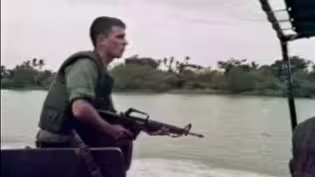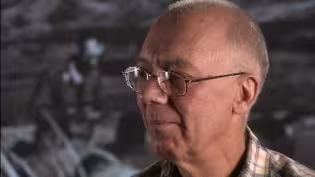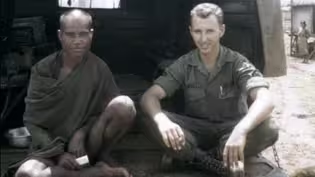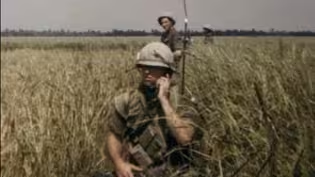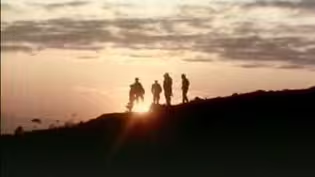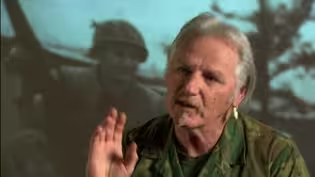
Vietnam: Turning Point - Hue City
Clip: 5/25/2010 | 6m 47sVideo has Closed Captions
The battle at Hue City highlighted the dire state of the Vietnam War.
February 1968 The battle at Hue City highlighted the dire state of the Vietnam War. Scenes of lethal sniper fire and civilian deaths described by veterans are juxtaposed with the American public's increasing animosity toward the war. (Part 5/7)
Problems playing video? | Closed Captioning Feedback
Problems playing video? | Closed Captioning Feedback
Wisconsin Vietnam War Stories is a local public television program presented by PBS Wisconsin
Thanks to lead gifts from Don and Roxanne Weber, Associated Bank, Ho Chunk Nation and the Lynde and Harry Bradley Foundation.

Vietnam: Turning Point - Hue City
Clip: 5/25/2010 | 6m 47sVideo has Closed Captions
February 1968 The battle at Hue City highlighted the dire state of the Vietnam War. Scenes of lethal sniper fire and civilian deaths described by veterans are juxtaposed with the American public's increasing animosity toward the war. (Part 5/7)
Problems playing video? | Closed Captioning Feedback
How to Watch Wisconsin Vietnam War Stories
Wisconsin Vietnam War Stories is available to stream on pbs.org and the free PBS App, available on iPhone, Apple TV, Android TV, Android smartphones, Amazon Fire TV, Amazon Fire Tablet, Roku, Samsung Smart TV, and Vizio.
Providing Support for PBS.org
Learn Moreabout PBS online sponsorship[solemn music] - Sam King: We'd been on patrols and been in it a little bit, but nothing 'til Hue City.
Tet New Year in '68, the Viet Cong overran Hue City, took it and dug in, and we had to go in and dig 'em out.
And I mean literally, you know, dig 'em out.
Outta holes, outta little bunkers.
I went into Hue City low man on the totem pole, you know, PFC, with a full squad.
Came out with a full squad, I think it was 14 days later.
But it was me and one other guy were the only two from original ones that went in.
The rest were either killed or wounded.
- Charlie Wolden: They formed up a large group of people and they issued us new weapons and gear, and put us on trucks headed to Hue.
The trucks we had had boxes of ammo.
Crates of mortar rounds; we're sitting on top of it.
So we're all sitting on top.
And as we're going into Hue, people were coming out of Hue, just streaming.
It was like the parting of the Red Sea.
These people are just getting out of our way, and we were smoking into Hue.
First thing I saw was a tank jammed up into a building; it was all burned out.
There was a jeep that was all burned out with a body hanging out of it.
And the billows of dust coming up, you couldn't see in front of you.
And then the shooting started.
And it was just deafening.
And I'd see flashes coming out of the buildings around us.
I didn't know if anybody was shot or what.
The next thing I remember, I'm laying on the ground.
Boxes of ammo all over the place, the mortar rounds we were sitting on.
And the truck was on its side; hit a bomb crater.
And it just went over, okay?
And a "ping, ping."
And when a bullet goes near ya, it's "snap."
But it was hitting the ground.
It was like "crack, crack, crack crack, crack."
And they were hitting dust all around me, and I thought, "I'll just lay here, they'll think I'm dead."
And the other thing that came really apparent right then, there was no background music.
Man, this is real.
As simple as that is.
This is real.
- Well, the guys that had been there a long time had never been in something like that, Hue City.
You know, sometimes the bullets would be flying, tracers.
It almost looked like you could walk on it.
I was totally baptized in all aspects of it, from seeing my friend die to seeing the enemy die at my hands.
That changed me forever.
- Nobody knew how big a unit it was or anything.
They started sending Marine companies in there, and they just, they were just too little, okay?
The NVA were all over the place.
They were on streets, they're in alleys, they're in buildings.
They were all over the place.
And it was every day.
Every day, we're making contact.
Every day, we're taking casualties.
Every day, we're going through houses.
Every day, we're running across streets that had snipers block by block.
- It had to take us some time of day to go a hundred yards, if you were lucky.
And the heat and the smell.
The smell is something else.
Smell in combat, smell in war after a battle that's went on for a few days, it's just something else.
Blood has its own smell.
Smells like hot copper.
- We were down from a squad of maybe a dozen people down to five.
And they sent our squad out on kind of a recon.
And all of a sudden, all hell broke loose.
I mean, it was just, "shoo, shoo, shoo, shoo," all over us, okay?
And I had a sharp pain in my, right here, right underneath my arm.
I said, "I think I was hit!"
And Cole looks at me, and Cole, over the top of Denham, he said, "The count of three, we're outta here.
One, two, three!"
And we got up, I got up, Denham got up, and it right just "poof" out of his back.
I mean, it was instantaneous, but it's imprinted in my mind.
"Poof," and he fell forward, right between the shoulder blades.
- Guys who run, you know, through fire, I think some of the bravest people did the bravest acts I ever seen never have gotten any credit.
Didn't really want any.
- I mean, I ran out and got that guy, okay?
And I did it because I was terrified.
But my definition of being a hero as a child was you're John Wayne; you're fearless, okay?
Hell, I was terrified over there.
I think the definition is overcoming your fear to do your job.
And I don't think much of the word "hero," any way you look at it.
- You never knew where they were gonna spring up from.
You couldn't call in your airstrikes because it was the ancient capital and the Vietnamese government didn't want any airstrikes called.
That citadel wall, it was a castle.
So they knew you were gonna come through these particular gates into the inner city, into the citadel itself.
And they were just set up there with machine guns.
- We were only allowed to have, in Hue, on the south side, direct-fire weapons.
That means we didn't have any mortars or artillery.
They didn't wanna destroy the city.
Ancient courtyards; these things are hundreds of years old.
Don't wreck the courtyards, okay?
And the irony of it is, before we were done, the city was in rubble.
Just what you had to do 'cause it was every damn house.
- But it wasn't until late in the battle that they actually let two planes that had to be Vietnamese pilots come in and knock out a section of the wall.
When we finally took the citadel, it was kinda over.
It was mopping up.
Got through that unscratched, which amazes me to this day.
Come home, and the war, after the Tet of '68, it got terribly unpopular among the people.
That was a hard thing to go through.
Screaming the standard "Baby killer," and "You should've died in Vietnam."
For doing what we considered our duty.
All us 18, 19, 20-year-old Marines and soldiers, airmen, Navy guys, we didn't know about the damn politics of the thing.
Most of us hadn't been old enough to vote hardly, you know?
I hate to say it about my country, but at that time, it was not a good place to be if you were in the military.
So I asked for orders back to Vietnam.
- They were saying, "Don't mean nothing, "don't mean a goddamn thing.
"Suck it up; don't mean nothing.
"Don't mean a damn thing.
"Don't put a meaning on it.
"You put a meaning on it, you start thinking about it.
"You start thinking on it, you start feeling.
Suck it up and move out."
And the purpose was to get us through, the be emotionally and physically surviving.
We called it "The 'Nam."
"The 'Nam" and the world.
That was the real world, this was the surreal world.
This was not real.
This isn't the world.
This is not the world that I wanna live in.
That's the world.
But I just didn't fit.
Vietnam: Turning Point - Brown Water Navy
Video has Closed Captions
Clip: 5/25/2010 | 8m 12s | River-based Army and Navy veterans describe facing enemy attacks and Agent Orange. (8m 12s)
Vietnam: Turning Point - Khe Sanh
Clip: 5/25/2010 | 7m 36s | One of the bloodiest battles of the Vietnam War took place at Khe Sanh. (7m 36s)
Vietnam: Turning Point - Montagnards
Video has Closed Captions
Clip: 5/25/2010 | 6m 57s | Veterans discuss working with the Montagnards, people indigenous to Vietnam. (6m 57s)
Vietnam: Turning Point - TET 1968
Video has Closed Captions
Clip: 5/25/2010 | 8m 13s | The Tet Offensive shocked both soldiers and the American public. (8m 13s)
Vietnam: Turning Point - The Price
Video has Closed Captions
Clip: 5/25/2010 | 8m 19s | Veterans reflect on the staggering casualties in Vietnam, and how they coped. (8m 19s)
Vietnam: Turning Point - Walking Point
Video has Closed Captions
Clip: 5/25/2010 | 6m 56s | Veterans describe the dangers and responsibilities of walking point. (6m 56s)
Providing Support for PBS.org
Learn Moreabout PBS online sponsorshipSupport for PBS provided by:
Wisconsin Vietnam War Stories is a local public television program presented by PBS Wisconsin
Thanks to lead gifts from Don and Roxanne Weber, Associated Bank, Ho Chunk Nation and the Lynde and Harry Bradley Foundation.
